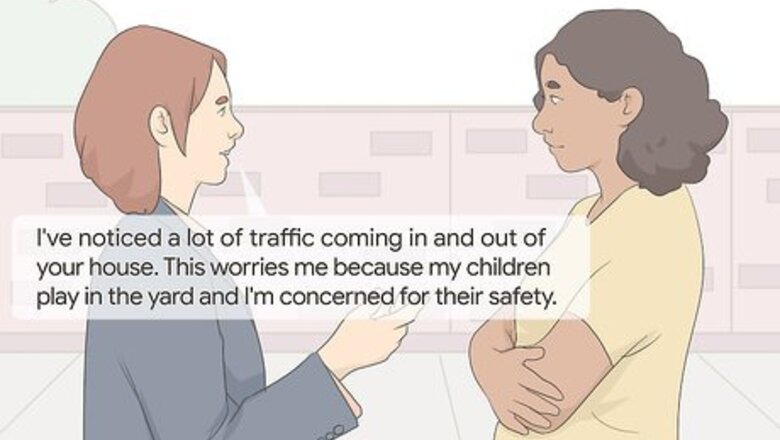
views
X
Research source
Gathering Information and Evidence
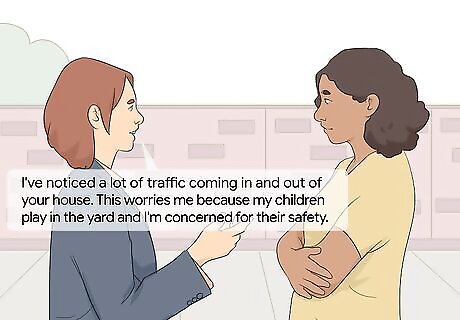
Have a conversation with your neighbor first. As long as you feel comfortable talking to them, approaching your neighbor with your concerns may do something to alleviate the problem without needing to report the business to higher authorities. Approach them in a polite, friendly manner, and try to avoid being confrontational. For example, you might say "I've noticed a lot of traffic coming in and out of your house. This worries me because my children play in the yard and I'm concerned for their safety." If noise is the issue, you might say "I would appreciate it if you could find some way to minimize the sounds coming from your home. They often keep us up at night when we have to be at work in the morning." Avoid threatening your neighbor or insulting them personally. Focus on finding a solution to the problem that will allow you all to live peacefully in the neighborhood. If you don't feel comfortable approaching them face-to-face, write a letter discussing your concerns and invite them to help find a solution.Tip: Don't gang up on the person. Even if others in your neighborhood share your concerns, coming to talk to them as a group could put them on the defensive and make them feel attacked.
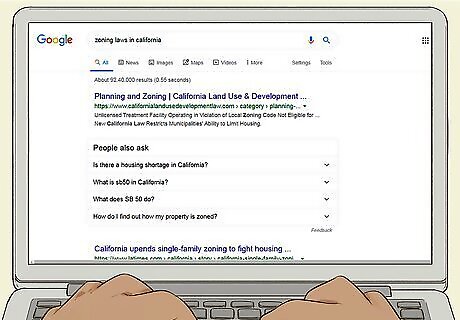
Look up local codes and zoning laws for your area. In many residential areas, local ordinances control what people can or cannot do on their property. If your neighborhood is zoned purely residential, your neighbor may not be able to run a business from their home, even if they have all the required permits. To find the zoning codes in effect for your neighborhood, visit a city planning or similar city government office. You may be able to find the information you need on the city government website. In many towns and cities, the town or city council is in charge of zoning. If you live in a more rural area, you may need to speak with a county or similar regional government official. Typically, zoning is less stringent in rural areas that are less densely populated.

Find out if the business has all the required licenses and permits. Most local governments require businesses to have a business license to operate in the area. Additionally, the person may need other permits depending on the type of business they're running. Your local small business association or commerce board would have information on the licenses and permits required in your area. Typically, you can use an online directory to look up your neighbor or their business and see if they're properly registered and have the licenses or permits they need to conduct business. If they don't have the right licenses or permits to run their business, report them to the licensing authority. However, keep in mind that doing this typically won't get rid of the problem. Your neighbor can simply pay a fine and get their license, then continue as they were.
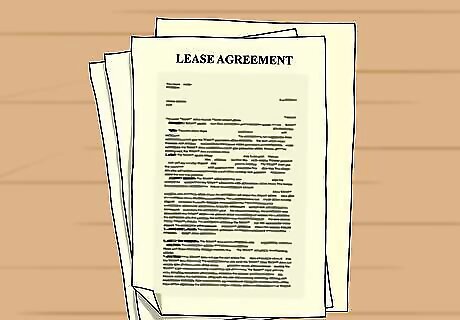
Check your residential agreement for restrictions. If you live in an apartment building or complex, the landlord may prohibit tenants from operating certain types of business on the property. This information would be included in your lease. Likewise, if you live in a community that has a homeowners' association (HOA) or co-op board, they may have rules regarding the kinds of business activities you can conduct in your home. HOAs and co-op boards tend to be much more restrictive about operating businesses on your property than landlords are. In some of these communities, you can't operate a business out of your home at all, even if you don't see any clients there or cause any neighborhood disturbances. Even if there's nothing in the agreement that prohibits operating a business, there are likely provisions that prohibit certain types of disturbances, such as excessive traffic or noise. You may be able to get your neighbor for violation of the agreement this way, regardless of whether they're technically allowed to run a business from home or not.
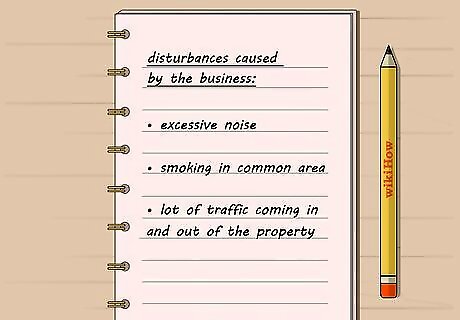
Document disturbances caused by the business. If you've decided you want to report someone for running a business from their home, it's likely because the business is causing problems that interfere with your ability to enjoy your own home. Take photos and videos to document the problems caused by the business. For example, if your neighbor has clients coming in and out of the home who are taking up parking spaces or spilling out into the road, you might take photos of all the cars around the home. If your problem is noise, make audio recordings to document the problem.Tip: In addition to photos, audio, and video recordings, keep a log documenting the activity surrounding the business and the disruption it's causing. Write down the type of disturbance along with the date and time.
Lodging Your Complaint

Talk to your property manager about violations or disturbances. If you live in an apartment complex or building, or a community run by a homeowners' association or co-op, appeal to them about your neighbor. Explain the problems you're having with the business they're running out of their home and provide any evidence you have of disturbances you've experienced. If your neighbor is in violation of a lease or other residential agreement, point out the clauses that they are violating. Usually, the property manager will take care of the situation. Put your complaints in writing so that you have a record of having made the report. Follow up within a couple of weeks if the disturbances don't end to find out what has been done. If other members of your community are disturbed by the business, encourage them to report the problem to the property manager as well.
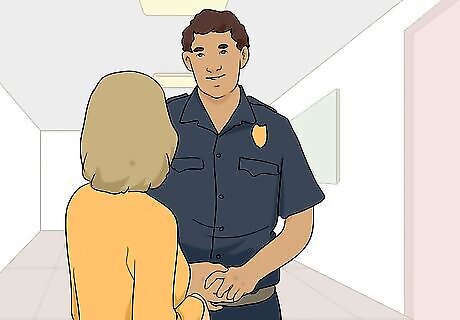
Report a violation to your local code enforcement department. If you live within city or town limits, your local government likely has a code enforcement department that handles violations of the city or town code. Typically, there will be a link to this department on your city or town's website. You can also visit the local government offices and ask where to report a code violation. Provide the evidence you have of your neighbor's disturbances or code violations. If you know the ordinances being violated, cite them specifically in your complaint. Keep records of your complaint and follow up within a couple of weeks to find out what actions were taken.Tip: Typically, violations of local code are not a crime. Most likely, the violations will result in your neighbor being fined. Reporting your neighbor for local code violations likely won't result in the business being shut down, and may not end the disturbances.

Contact your city council. In many areas, the city council has the authority to mediate disputes between neighbors and assess fines or other penalties for violation of the local code. Filing a report with your city council may help resolve the problems you have with your neighbor's business. When talking to a city council member or submitting a written report, focus more on the harm that's being done to the community as a whole by the business's presence, rather than how it may be inconveniencing you personally. Particularly if the members of your city council are elected officials, they may be more responsive to your complaints than other local government workers.
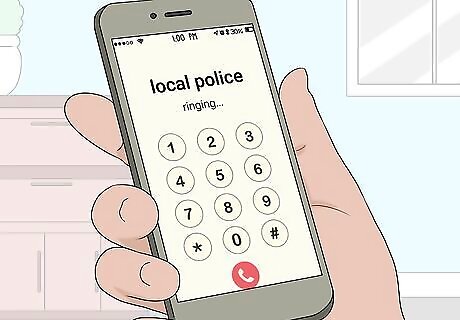
Call the local police if necessary. If the disturbance coming from your neighbor's home-based business reaches the level that you feel it's a serious concern to the safety or residential quality of the neighborhood, contact the local police over a non-emergency number and file a report of your neighbor's behavior and the effect it's having. For example, if clients coming in and out of your neighbor's home are causing traffic congestion in your neighborhood, you might have local police come out and issue a warning. If your neighbor's business is excessively noisy at night, the local police will come out to investigate the noise disturbance and issue a warning. Provided it's warranted, calling the police might have a greater effect than some other means of reporting because having the police come out is generally not good for business.
Taking Other Action

Talk to an attorney about filing a lawsuit. If you've reported your neighbor's activities and the disturbances they cause to multiple government departments and the situation hasn't improved, you may have to sue them to achieve your desired result. An attorney who specializes in dealing with neighbor disputes can help you decide if your situation is appropriate for the courts. Most attorneys provide a free initial consultation. You can use this meeting to explain your situation and go over various possible solutions. Typically, an attorney's first action will be to send a sternly worded cease and desist letter to your neighbor. This letter lays out the disturbance they're causing to you and the neighborhood in clear terms and asks them to find a solution by a certain date.

Make posts about the disturbance on social media. If you're connected with other people in your neighborhood on social media, you can use that as a platform to discuss the situation and find out if others in your community are as bothered by it as you are. You're also drawing negative public attention to your neighbor's business, which may encourage them to take care of the problem on their own. If your community or neighborhood has hashtags, use those to draw attention to your posts from other community members you may not be connected to. Tag your neighbor's business if they have business accounts on social media. That will also get their attention and bring them into the discussion.Tip: Be specific and firm in your social media posts, but don't make disparaging comments about your neighbor or their business. Your posts will have more impact if you include photos or videos to back up your claims.

Speak up at community or city council meetings. City or town council meetings are typically public and allow you to air your grievances. These meetings can be a good place to present your case to the council and the public, especially if you've submitted a complaint to the council already and nothing has been done to fix the problem. If you live in a co-op or planned community with a home owner's association, raise your concerns at the next co-op board or HOA meeting. Bring any photos or videos to share and help illustrate the problem.



















Comments
0 comment